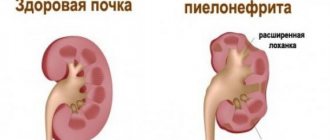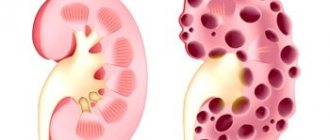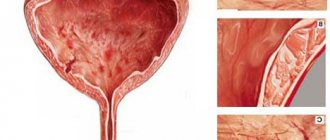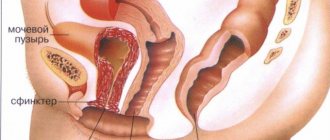Inflammatory process of the kidneys or nephritis is a disease localized in the pyelocaliceal apparatus of the organ, tubules, glomeruli or vessels. In most cases, the inflammatory process in the kidneys is the result of hypothermia. Sometimes nephritis is the result of the development of genetic or acquired pathologies, insufficiency of the genitourinary system, pregnancy. The causative agents of kidney disease in women and men are staphylococci, enterococci or E. coli. Absence or improper treatment for kidney inflammation can lead to negative consequences for the entire body, however, only a specialized specialist can prescribe kidney treatment based on test data and observations of the course of the pathology.
Important! With kidney inflammation, the development of pathology can be acute or hidden. The danger of nephritis lies in the possibility of developing renal failure
Types of inflammation
Most often, kidney inflammation in women has the same causes - infections. There are several types of inflammatory processes.
With pyelonephritis, inflammation of the pelvis and parenchyma of the organ occurs against the background of infection. The pathogen enters the organ through the blood, lymph, or ascending route. The disease can occur in both acute and chronic forms. Symptoms include increased body temperature, characteristic pain in the kidney area, and frequent urge to go to the toilet.
Glomerulonephritis does not affect the entire kidney, but only the renal glomeruli - glomeruli. Because of this, blood purification and normal urination are disrupted in the body. Gradually, the glomeruli can be replaced by connective tissue. Glomerulonephritis is an autoimmune disease.
Less common are interstitial and shunt nephritis, in which the corresponding parts of the organ are affected. Any inflammation of the kidneys should be identified as quickly as possible. If the disease is left untreated for a long time, it can lead to kidney failure and even further organ transplantation.
Medicines
Since the main inflammatory factor is infectious lesions, the most common drugs for their treatment are antibiotics. They are actively used in the treatment of cystitis and pyelonephritis, renal tuberculosis and glomerulonephritis.
In addition, the following are assigned:
- Diuretics made from plant materials that have a beneficial effect on the condition of the kidneys and the general well-being of the patient.
- Preparations with the active ingredient in the form of pipemidic acid. Such medications include Pimidel, Urotractin or Palin. These medications are most effective in treating urinary inflammation in the male population that occurs against the background of prostate adenoma. These medications should be taken twice a day after meals, one pill at a time. But such drugs are contraindicated for pregnant women and children.
- Medicines of plant origin with uroantiseptic action. Canephron is usually prescribed, which is produced in tablet form and in the form of drops. Take it 50 drops or 2 pills three times a day. Phytolysin, which is produced in the form of a paste, can also be prescribed. A teaspoon of paste is dissolved in half a glass of warm sweetened water.
These herbal remedies must necessarily be combined with antimicrobial antibacterial therapy, carried out with drugs like:
- Ofloxacin or Ciprofloxacin, which in tablet form is taken twice a day, and in injection form is administered intravenously at a dosage of 200-400 mg of the drug. Use is contraindicated for children and pregnant women.
- Norfloxacin, which is also taken twice a day, 400 mg for a 1-1.5 week course. Also contraindicated for children and pregnant women.
- Aminopenicillins like Penicillin or Amoxicillin. Penicillin is usually used to treat renal inflammation in pregnant patients.
- Cephalosporin antibiotics like Cephalexin, Cefalotin, Zinnat, Claforan. Quite effective drugs that significantly improve the condition of patients already on the third day of therapy.
- Aminoglycosides, especially in complicated pyelonephritis. Amikacin, Gentamicin, Netilmicin, etc. are prescribed.
The list of medications for kidney inflammation is as follows:
- Diuretics like Hydrochlorothiazide, which should be taken 1-2 pills daily after breakfast;
- Antibacterial drugs, for example, Meropenem, which must be taken 500 mg intravenously every 8 hours;
- Normalizing renal blood circulation - Trenpental. The drug is usually administered intravenously as part of an infusion. Contraindicated for children;
- Antihypertensive drugs such as Verapamil, which should be taken one tablet twice a day while eating. Not prescribed for pregnant women.
Quite often, for inflammation of the kidneys in men and women, injections are prescribed to eliminate infectious processes in the kidneys and urinary system. The most common injections include Tsifran, Tsiprobay, etc. But such drugs can only be prescribed by a nephrologist or other treating specialist; their independent use is dangerous.
Potent injections that relieve kidney inflammation have an accelerated therapeutic effect, but they are usually not recommended for use during childhood or pregnancy. Such injection therapy is carried out in a hospital setting under strict medical supervision. Video review of medications for the treatment of kidney inflammation:
Why do the kidneys become inflamed?
The causes of inflammation can be different. The most common is an infectious pathogen that has entered the organ. Kidney problems can be caused by the following microorganisms:
- staphylococci;
- enterococci;
- tuberculosis bacillus;
- coli.
In some cases, inflammatory processes in the kidneys appear due to the development of several infections simultaneously. The causes of the processes are associated with viruses and bacteria in 80% of cases of the disease.
In addition to infections, other factors can cause kidney inflammation. Among them are the following reasons:
- poisoning of the body with heavy metals;
- work in an environment with a high content of toxic substances;
- diseases of the immune system;
- alcoholism.
Sometimes the causes of kidney inflammation lie in another, already suffered disease. That is, nephritis appears as a complication, for example, after a viral infection. Or the problem may arise due to living in unsuitable conditions. Where it is always damp and cold, it is difficult to maintain kidney health.
In what cases is surgery necessary?
Surgical intervention is performed in extreme cases when conservative methods are ineffective, purulent inflammation and other complications. The operation is prescribed for:
- necrosis of renal tissue;
- hydronephrosis;
- tumors;
- kidney stones.
To reduce the risk of postoperative complications, minimally invasive interventions are used. They are performed under endoscopic control using trocars, which are inserted into mini-incisions in the abdomen or lower back.
- Inflammation of the bladder in women: treatment, symptoms, what medications to take
Symptoms of inflammatory processes
In order to start treating nephritis on time, you need to be able to quickly recognize the signs of the disease. The symptoms of the disease are especially pronounced in women. This is mainly due to the structural features of the female body.
The first signs of nephritis are:
- increased sweating;
- nagging pain in the lower abdomen;
- signs of intoxication;
- very high body temperature;
- dizziness and headaches of various types.
Some people suffering from inflammation in the kidneys complain of painful urination and pain when tapping the organ area. In addition, the urine becomes more cloudy, and during laboratory analysis you may notice an increase in the content of white blood cells, red blood cells or proteins.
It is easier to detect the acute form of the disease, because it has pronounced symptoms. How much more difficult is it to start treating chronic inflammation? What are the symptoms of this form of the disease?
You need to treat your kidneys if you have the following clinical picture:
- periodic increase in body temperature to subfebrile;
- increased sweating at night;
- loss of appetite;
- general weakness and decreased performance;
- hypertensive manifestations;
- dry skin, yellowish tint.
Often the occurrence of inflammation in the female genitourinary system is associated with a hereditary predisposition or with the presence of a similar disease in the past. If such a problem appears, competent treatment and further monitoring are required in order to prevent relapse.
Diagnostics
If you suspect kidney inflammation, you must undergo laboratory tests of urine and blood. The presence of an inflammatory process may be indicated by an increase in leukocytes and erythrocytes in the urine, the presence of protein, and a pH adjustment of 6.2-6.9. Urine is cloudy and dark. ESR increases in the blood and leukocytosis is present. Urine culture reveals a specific inflammatory pathogen; the number of bacteria per 1 ml of urine is more than 105.
To study the functionality of the kidneys, a urine test according to Zimnitsky is taken every 3 hours during the day. With inflammation, the density of urine decreases, the amount of urine excreted at night prevails over that during the day.
Instrumental methods:
- Ultrasound of the kidneys,
- excretory urography,
- x-ray with contrast,
- CT,
- angiography of the renal vessels.
Methods for treating kidney inflammation
Before prescribing treatment, it is very important to conduct a full examination and correctly determine the type of inflammation. During periods of acute disease, treatment is required under the supervision of a specialist, preferably in a hospital.
Treatment will directly depend on the type of nephritis. At the same time, the principles of combating the disease are the same:
- daily regime;
- proper nutrition;
- taking medications regularly;
- maintaining the temperature regime for the body and legs.
The treatment chosen may also depend on the symptoms in each individual case. For example, if a patient’s blood pressure begins to increase due to renal dysfunction, antihypertensive medications may be recommended. To cope with the pathogen that provoked the inflammatory process, you will need to take antibiotics.
Kidney treatment may also include taking diuretics and calcium-containing drugs. In some situations, tablets that normalize blood circulation in the vessels of the kidneys may be useful. This improves the nutrition of the organ and speeds up recovery.
Sometimes the patient may be prescribed vitamin complexes, antihistamines and drugs to enhance immunity. This comprehensive treatment typically results in most patients feeling significantly better within a week.
It is important to take into account the fact that if the inflammation was caused by some kind of bacteria or virus, then even if relief occurs, it is important to undergo a full course of antibiotic therapy.
As a rule, antibacterial drugs are taken for at least 7-10 days. Such treatment will be more effective, and the risk of relapse is minimized.
Recommended Diet
In kidney disease, diet plays an important role. It is important to eat in such a way as to minimize the load on the diseased organ. The bulk of nutritious foods should be cereals, vegetables and fruits. Although the body needs meat and salt, it is important to minimize the amount of consumption.
Although it is necessary to drink water if you have kidney problems, if you have severe swelling, the amount should also be reduced. In other cases, it is advisable to adhere to the standard daily volume of fluid - 2 liters.
During nephritis, fried, smoked and very salty foods are strictly not recommended for the patient. You should also avoid any dressings, ketchups, marinades and spicy foods. During treatment, it is better to exclude any canned foods.
These temporary restrictions will only contribute to the speedy recovery of the inflamed organ and will benefit the entire body. Strict adherence to the doctor’s recommendations will allow you to cure the disease and maintain your health in order.











